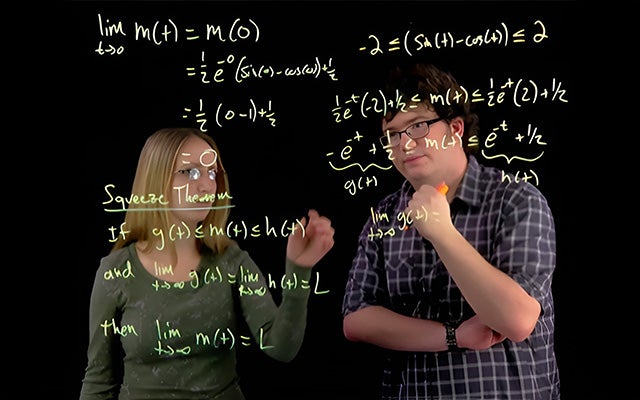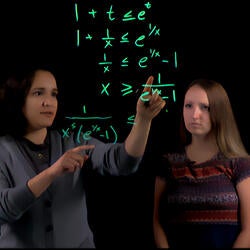Mathematics is the study of quantities and their changes, patterns, shapes, transformations, and their applications to the world around us using logical reasoning, computation, and abstraction.
What makes Mathematics unique at UCR?
Multiple concentrations allow students to focus on their own interests within mathematics by applying it to other subjects like economics or biology. You can prepare for national math competitions like the Putnam and Mathematical Contest in Modeling with faculty mentors.
In general, what are Mathematics professors investigating?
- How can we approximate solutions to equations we cannot solve?
- What tools can we develop for distinguishing mathematical objects?
- What patterns can we find by repeating a function?
- Are there infinitely many twin primes?
Why Mathematics at UCR?
There are lots of opportunities for undergraduate research and independent reading with mathematics faculty and graduate students. We also have a vibrant community of student clubs.
Mathematics research at UCR
- Algebra: Commutative algebra, Representation Theory, Combinatorics, and Algebraic Geometry
- Analysis: Harmonic Analysis, Functional Analysis, Partial Differential Equations, Operator Algebras, Several Complex Variables, Fluid Mechanics, Probability Theory, Mathematical Physics, Fractal Geometry and Dynamical Systems, and Approximation Theory
- Geometry and Topology: Algebraic Topology, Low Dimensional Topology, Geometric Group Theory, Differential Geometry, Riemannian Geometry, Complex Differential Geometry, and Geometric Analysis
- PDE and applied: Mathematical Biology, Multi-scale Mathematical Modeling, Computational Mathematics, Scientific computing, Modeling of fluids, Partial Differential Equations, Optimization, Machine Learning, Inverse Problems, Image Processing, and computational methods for nonlinear partial differential equations
What industries can I get into with a Mathematics degree?
- Education
- Finance and Economics (investment banking, economic analysis)
- Data Science and Analytics
- Technology and Software Development
- Graduate study in Mathematics or Statistics
- Engineering
- Operations Research and Management Science
- Cryptography and Cybersecurity
- Biostatistics and Epidemiology
- Actuarial Science
- Research and Development
- Public Policy and Government
- Consulting
What you should know
Mathematics at the university level goes beyond the computational and formula-based approach often seen in high school. It requires exploring abstract concepts, logical reasoning, and developing rigorous mathematical proofs to understand WHY things are true. The ability to persist through challenges, and to view them as opportunities for growth rather than setbacks, is crucial. Take advantage of the resources available to help you make connections socially and academically.
Advice for success
Focus on understanding the fundamental concepts thoroughly. Math is cumulative, so a solid grasp of the basics is crucial for tackling more advanced topics. You'll likely encounter difficult topics that require significant effort to understand. Don't be discouraged by these challenges. Persistence and resilience are key in mathematics. Take advantage of the resources available: talk to your professors, TAs, and other classmates. Math is collaborative and interactive. Find a study group and join a club!
Consider this
A big part of mathematics is not just using formulas but understanding and explaining why things are true. One goal of our upper division courses is to teach you to make these arguments for yourself. Pursuing a degree in mathematics will sharpen your creative thinking, strengthen your analytical skills, and improve your ability to solve complex problems. Consequently, you'll become a more attractive candidate in the job market and stand out in the competitive professional landscape!
Available Minor in Mathematics
Mathematics Minor



